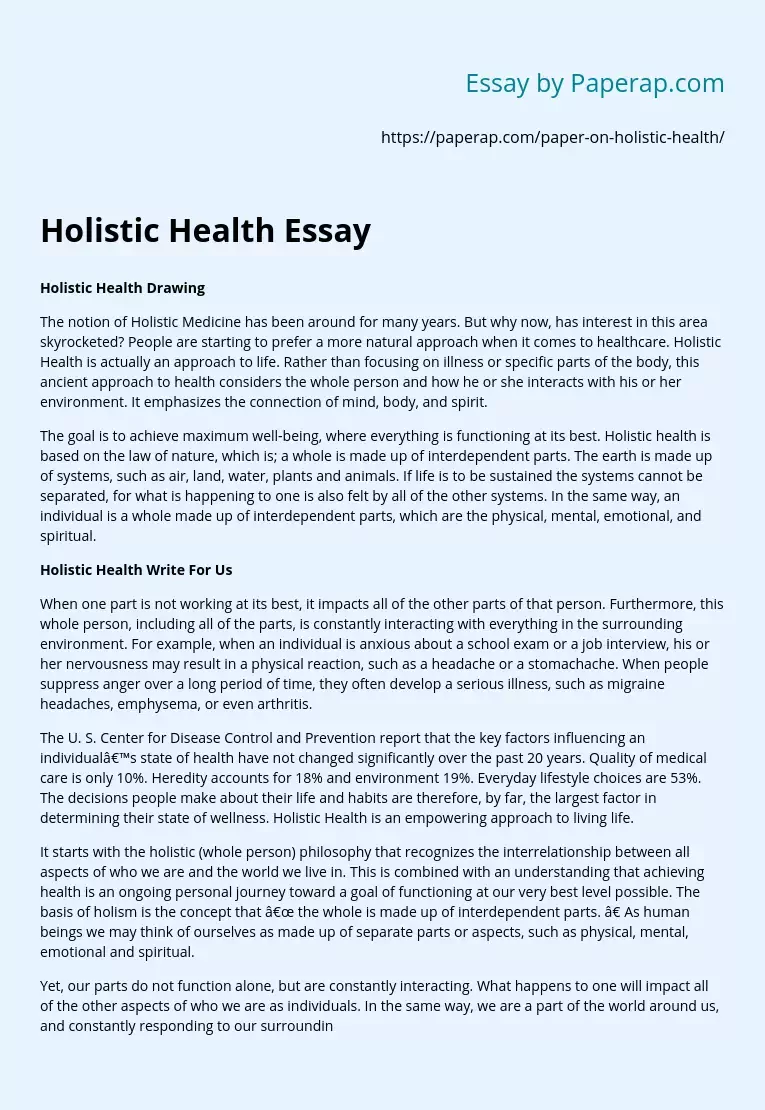Essay on Holistic Health and Holistic Medicine
What is Holistic Health and Holistic Medicine
The notion of Holistic Medicine has been around for many years. But why now, has interest in this area skyrocketed? People are starting to prefer a more natural approach when it comes to healthcare. Holistic Health is actually an approach to life. Rather than focusing on illness or specific parts of the body, this ancient approach to health considers the whole person and how he or she interacts with his or her environment. It emphasizes the connection of mind, body, and spirit.
The goal is to achieve maximum well-being, where everything is functioning at its best. Holistic health is based on the law of nature, which is; a whole is made up of interdependent parts. The earth is made up of systems, such as air, land, water, plants and animals. If life is to be sustained the systems cannot be separated, for what is happening to one is also felt by all of the other systems.
In the same way, an individual is a whole made up of interdependent parts, which are the physical, mental, emotional, and spiritual.
When one part is not working at its best, it impacts all of the other parts of that person. Furthermore, this whole person, including all of the parts, is constantly interacting with everything in the surrounding environment. For example, when an individual is anxious about a school exam or a job interview, his or her nervousness may result in a physical reaction, such as a headache or a stomachache.
When people suppress anger over a long period of time, they often develop a serious illness, such as migraine headaches, emphysema, or even arthritis.
The U. S. Center for Disease Control and Prevention report that the key factors influencing an individual’s state of health have not changed significantly over the past 20 years. Quality of medical care is only 10%. Heredity accounts for 18% and environment 19%. Everyday lifestyle choices are 53%. The decisions people make about their life and habits are therefore, by far, the largest factor in determining their state of wellness. Holistic Health is an empowering approach to living life.
It starts with the holistic (whole person) philosophy that recognizes the interrelationship between all aspects of who we are and the world we live in. This is combined with an understanding that achieving health is an ongoing personal journey toward a goal of functioning at our very best level possible. The basis of holism is the concept that “ the whole is made up of interdependent parts. ” As human beings we may think of ourselves as made up of separate parts or aspects, such as physical, mental, emotional and spiritual.
Yet, our parts do not function alone, but are constantly interacting. What happens to one will impact all of the other aspects of who we are as individuals. In the same way, we are a part of the world around us, and constantly responding to our surrounding environment. Holistic health involves our everyday choices and actions as we strive to reach a higher level of personal wellness. Picture the various levels of wellness as a continuum. Where are you? Are you on the left half, dealing with an illness or a chronic condition? In the center, not sick, yet not feeling very peppy?
On the right half, in good shape, but striving for the highest possible level of vitality and well-being? A holistic approach to creating wellness includes taking charge of your own health by exploring a variety of life enhancing activities until you discover which ones work for you. While we think of holistic health in terms of our personal actions for self-improvement, the same holistic principles can be applied to dealing with any disease or chronic condition. When a healthcare practitioner applies these holistic principles, it is usually called holistic medicine.
In addition to the concepts already mentioned, other factors are added. The Healthcare professional and the patient work together as a team, rather than just eliminating or masking symptoms, the symptom is used as a guide to look below the surface for the root cause. Whenever possible, treatments are selected that support the body’s natural healing system. Consumers of health care services have been seeking out and switching their health care to holistic health care providers in greater numbers than ever before.
With the growing interest in holistic medicine, there has become a increasing number of practicing holistic physicians and healthcare providers who have increasingly put into practice some of these sought after ideals. They have preferred the safer, less costly, more effective and natural treatments, along with an emphasis on empowerment of the person, as a partner in there own health care and healing. Today, healthcare provides and patients understand the side effects connected with drugs, surgery, and synthetic materials.
While some holistic procedures are considered unorthodox by mainstream medicine, new research and patient testimonials are pointing to the fact that lacing any foreign substance in the body can have side effects. Interest in holistic medicine has increased tremendously in recent years, with more and more people becoming aware of the real benefits to be obtained from natural, intuitive and traditional healing methods. As we move into the future, perhaps more people will realize that a balanced approach with “all things considered” is more beneficial than techniques and synthetic materials.
Essay on Holistic Health and Holistic Medicine. (2019, Dec 05). Retrieved from https://paperap.com/paper-on-holistic-health/

